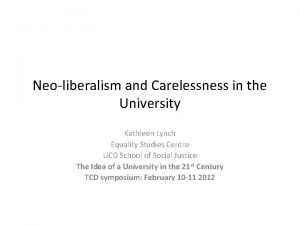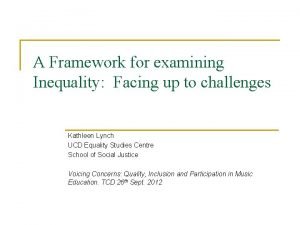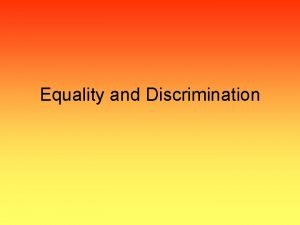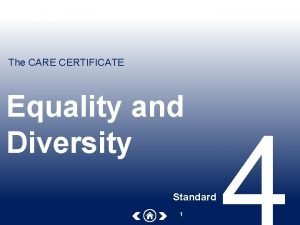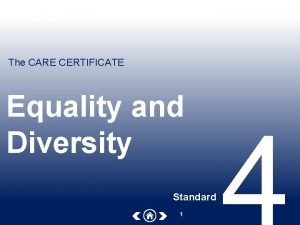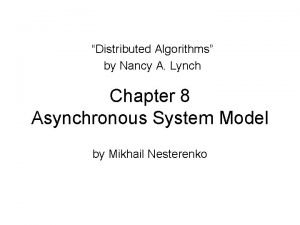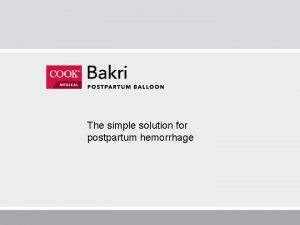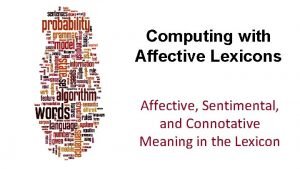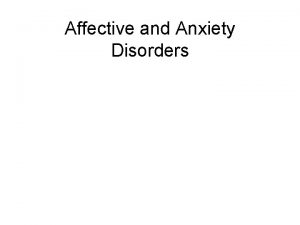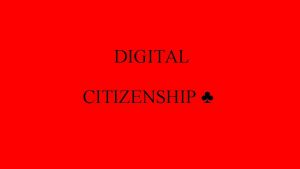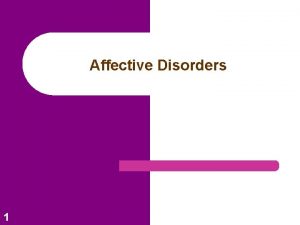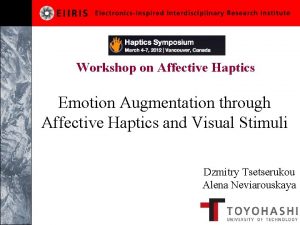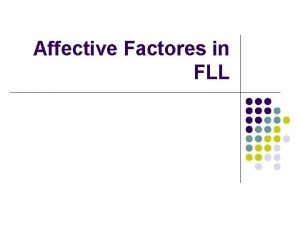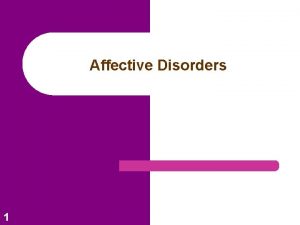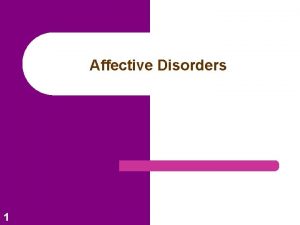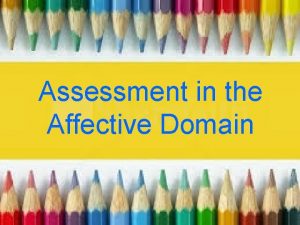Affective Equality Care Equality and Citizenship Kathleen Lynch













- Slides: 13

Affective Equality: Care, Equality and Citizenship Kathleen Lynch, UCD Equality Studies Centre, School of Social Justice, Dublin www. ucd. ie/esc www. ucd. ie/ewi WIDE Annual Conference, 18 th-20 th June, 2009 We Care! Feminist Responses to the Care Crisis University of Basel

What is Affective Equality About? n n It treats care as an equality and human rights issue It recognises: q q n a) the relational character of human beings (we live in profound states of interdependence economically, politically, culturally and socially - as well as environmentally b) human vulnerability – we are all at some time in our life deeply dependent It integrates a concepts dependency and interdependency into our understanding of equality, human rights and citizenship 2

Affective Inequalities n Affective inequality occurs directly when: n n people are deprived of the love, care and solidarity (LCS) they need to survive and develop as human beings the burdens and pleasures of care and love work are unequally distributed in society, between women and men particularly those doing love and care work are not recognised economically, politically and/or socially for that work Affective inequality occurs indirectly when: n n e. g. We are not educated regarding theory and practice of love, care and solidarity work in education and when love, care and solidarity work is trivialised by omission from public discourse 3

How Citizenship is defined Globally: Problems for Carers n Liberal perspective – values citizen as paid worker/public figure q q n Largely ignores the way race, gender, ethnicity, age, disability etc. influence citizenship status Silent on the reality of dependency and interdependency as central to human existence (treats loving and caring as private matters, and solidarity work as an option within civil society) Prevailing Neo-liberal Perspective - offers a market view of membership of society q q q Citizen is defined as a ‘consumer’, ‘client’ with the capacity to buy and sell services/products – caring is only valued on the market citizens are defined as autonomous, privatised persons, focus is on caring for oneself - individual responsibility for failure (undermining public goods) State’s role in public service provision and in state subvention is seriously circumscribed - adversely affects women both as carers and as paid workers 4

Competing Rational Economic Actors – Liberal and Neo-Liberal model of Citizens O = Self interested, Calculating, Competing Economic Actors. X = Competition Between Actors. 5

Care-less definition of Global Citizenship n n The Market economy has become the primary producer of cultural logic, of cultural value The emotional labour involved in caring and loving has been discredited and denied q q Primary care and love work seen as a necessity but also as a nuisance Caring is coloured by the context with which it is associated - oppressive The ‘coloniser within’ leads us to distance ourselves from caring: we learn to emulate the idealised self sufficient liberal (male-defined) ‘rational’ citizen We need to enable care discourses to redefine public discourse, policies and politics so that caring can be valorised economically, politically and culturally without being romanticised or commercialised 6

Masculinity is defined as Care-Less n n Feminine identities are assumed to be care-full (moral imperative on women to care) Masculine identities are equated with dominance (R. W. Connell, 1995, 2003) Men are assumed be care-less (men see breadwinning as caring (Lynch, Baker and Lyons Affective Equality: Love, Care and Injustice, 2009) Women are care’s foot soldiers; men are ‘care commanders – they can assign intimate care work (love labouring) to others 7

Relational Realities – A Care-Full Model of Citizenship Tertiary Care Relations – solidarity work Secondary Care Relations – general care work Primary Care Relations – love labour 8

Challenge for Carers - love labour (caring of intimately others) is inalienable and non-commodifiable n You cannot pay someone else to build or maintain your own relationship with intimate others; mutuality, commitment and feelings for others (and the human effort that goes with expressing these) cannot be provided for hire as they are voluntary in nature. n Love labouring in particular cannot be assigned to others without altering the very nature of the relationships involved; it is not possible to secure the quality of a relationship on a paid basis 9

Time and Love Labouring n Love labour time is not infinitely condensable; you cannot do it in less and less time (Folbre, 2004). It is not possible to produce ‘fast care’ like fast food in standardised packages. If we go the Mc. World route in caring what we will get is not care but ‘prepackaged units of supervision’, attending without intimacy or personal interest in the welfare of others (Badgett and Folbre, 1999) n The rationality of caring is different from, and to some degree contradicts, scientific and bureaucratic rationality. There is no hierarchy or career structure to relations of love labouring; they cannot be supplied to order n The goal is the relationship itself, there is no identifiable beginning, middle and end. The goal or objective is often diffuse and indefinable. 10

Conclusion 1: Care-full citizenship n n Caring occupies a similar structural role in relation to emotional life that material labour occupies in relation to economic life Caring (in the love labouring sense) has to be done – due to human vulnerability and developmental needs Need to make caring central to the definition of citizenship Education about citizenship must include education about loving, caring and solidarity 11

Conclusion 2: Need to Challenge the way masculinity and femininity are defined n n n Women are morally impelled to care while men are defined as dominant and careless Major challenge is to alter definitions of masculinity as well as definitions of femininity Need for a challenge to how we define what is a permissible subject in the public sphere 12

Conclusion 3: Creating egalitarian and social just world: 4 Key Contexts for the promotion of social justice Equality: From Theory to Action (2004) Baker, J. , K Lynch, S. Cantillon and J. Walsh) q q Economic Context - in economic relations; incomes/wages, wealth etc. n goal= equality of resources – no meaningful equality of opportunity without equality of economic condition Socio-cultural Context –in cultural relations - in systems of representation, interpretation, communication (in media, education etc. ) n goal=equality of respect and recognition Political Context – power relations - in formal politics, on boards, committees, in paid work and family/personal relations n goal=equality of power in public and private institutions **Affective Context (care relations) -wherever relations of love, care, and solidarity (LCS) operate - personal relationships, paid work relations, community and associational relations n goal=equality in the doing of care work and equality in the receiving of care 13
 Kathleen lynch ucd
Kathleen lynch ucd Kathleen lynch ucd
Kathleen lynch ucd Primary secondary tertiary care nursing
Primary secondary tertiary care nursing Substantive equality vs formal equality
Substantive equality vs formal equality Substantive equality vs formal equality
Substantive equality vs formal equality Care certificate equality and diversity
Care certificate equality and diversity Equality and diversity care certificate
Equality and diversity care certificate Post-partum restoration technology
Post-partum restoration technology Lynch howarth incision
Lynch howarth incision Erin dougherty lynch
Erin dougherty lynch Distributed algorithms nancy lynch
Distributed algorithms nancy lynch Lynch howarth incision
Lynch howarth incision Pph treatment algorithm
Pph treatment algorithm Ml strategic balanced index
Ml strategic balanced index
